It started as a conversation in an airport bar.
CNN was on the television, highlighting a story of how natural gas was quickly becoming the next motor fuel. The reporter interviewed a spokesman from the American Gas Association, who talked about how trucking company and car owners could save money and the air by switching to natural gas as a motor fuel.
I think I actually said “bull s&*t” quietly under my breath. Obviously, I did not say it quietly enough, as the gentleman sitting next to me turned and said, “Why do you think that it is bull s&*t?”
“Three points,” I answered. “First is the investment cost in the vehicle. Second is the investment cost in the delivery infrastructure. Third is that the price of oil will not stay this high.”
He sat there for a moment, looking at his drink. Then he let out a sigh and said, “My management team wants to shift our fleet over to natural gas trucks. I have been hesitating because I was not sure about your point on the price of oil. There is a ROI, but only with high oil prices.”
The rest of the conversation lasted about 15 minutes as we talked about the driving factors behind the price of oil. We agreed that the price of oil would drop as more US production came on line. At the end of the conversation, he declared, “I am going to tell the team that we are not doing natural gas.”
That is when I stopped him.
“How do you think the team is going to take that decision?”
He was quiet again. “They will not like it. They did the research and are convinced that this is the right way to go.”
That is when I made a simple suggestion, for me to spend a few days with the team, leading them to do an analysis as I had done with him at the bar. Letting them do the research, they would then be the ones to come to the conclusion that we arrived at.
“Think of it this way. If they do the work and decide it is a bad idea, they make the decision, not you. There is no way you are the ‘evil’ boss that made the decision. They did the work, and they made the decision.”
He liked my idea. Then I said, “Think of what you gain in the long run. They learn how to do the broad research into all of the facts and opinions, and develop the skills for looking beyond surface solutions. The next time they get an idea that is a major shift, they will know how to go through the details, and make the right decisions.”
That conversation turned into an engagement. Two weeks later, I spent three days with transportation managers and a financial analyst looking at the natural gas infrastructure, and how it compared with the oil network as an alternative motor fuel. In the end, the team agreed that moving the fleet to natural gas did not pencil out like they thought it would.
While the coaching engagement was only a few days, the team covered much ground in the research phase of the first day. With six people plus myself, the amount of material we found in our research was astounding.
In our presentation, we did not go into the depth presented in the following articles. However, as a group we discussed at length all of these topics, and the meaning that each had on the decision we had to make.
In the end, the group recommended not to make the investment on natural gas as a motor fuel for their fleet of trucks. At least, not yet. What drove the decision for the group was not the price of natural gas, if it went up or down. They learned that the investment in infrastructure and the vehicles was significant, so significant that even if the price of natural gas itself went up 10 times, the investment costs still drove the decision.
It took only one question to make the point. The final question: “What do you think the price of oil will be next year?”
Oil prices were high, but the same factors making natural gas plentiful were driving oil production in the US. Looking around the table I asked each member of the team what direction they thought oil prices would move. All thought the price of oil would go lower.
Articles in This Series
Articles in This Series

Dinosaur Farts
My great uncle John was a geologist. He spent most of his life looking at rocks in search of oil and gas. In John's day, oil and gas exploration looked nothing like it does today. There were no computer models, no seismographic shaker trucks, no 3D color spectral modeling or data analysis. What John did was go out in the field with a drilling crew, punch a hole in the ground, and look at the samples of stone that they would pull up ..... Read More

Plentiful Gas
My great uncle John was adamant that there was a plentiful supply of gas locked up in the shale layers over a mile below the Earth's surface. That summer evening around the camp fire in 1985, John described how the natural gas ..... Read More
Passing the Gas, in Liquid Form
There is a lot of promise in natural gas. We've used natural gas as a cooking and heating fuel for well

Piping Gas: The Components
Because it is a gas, natural gas wants to be free. The gas wants to mix with the other gases in the air, diluting ..... Read More

Piping Gas: Lines on Maps
So far, we have looked at various abstract design aspects of natural gas pipelines: the components, the relationship ..... Read More
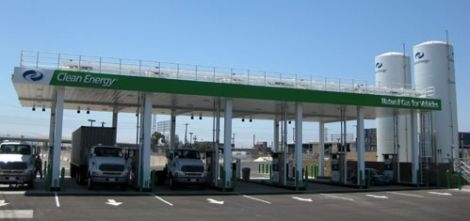
The Fuel Alternatives: CNG and LNG — Part 2
In Part 1, we started to explore the difference between the two storage methods for natural gas as a fuel for truck operations. Read More
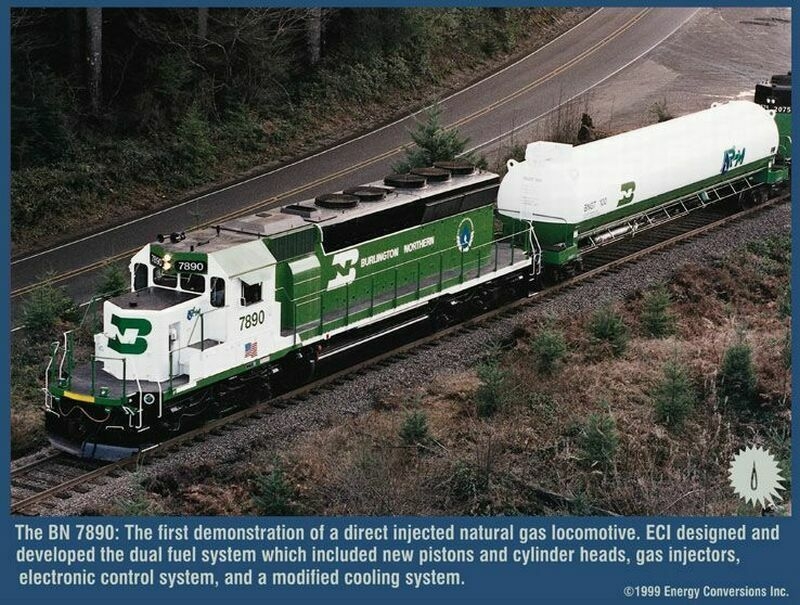
Natural Gas Trains
Railroads are the home of high horsepower diesel power. Pulling 100+ car trains of coal, oil, or freight requires ..... Read More

A Matter of When, Not If?
If or when? That is the question that some people ask. If you have followed our last 17 articles on this subject, you may have arrived at the same conclusion I have; natural gas is poised to increase in share as a motor fuel in North America, and perhaps other parts of the world. But I don’t think that natural gas will replace diesel.
Read More

Floating The Boats
Imagine a huge Thermos bottle on a ship. That is the basic concept behind an LNG tanker ship.

Piping Gas: Network Design
Natural Gas Pipelines are like highways — they tend to flow to population centers. Unlike the tax-supported ..... Read More

Piping Gas: Why Think About Pipelines?
One truth prevails. To make that statement reality, you have to dig, looking ..... Read More
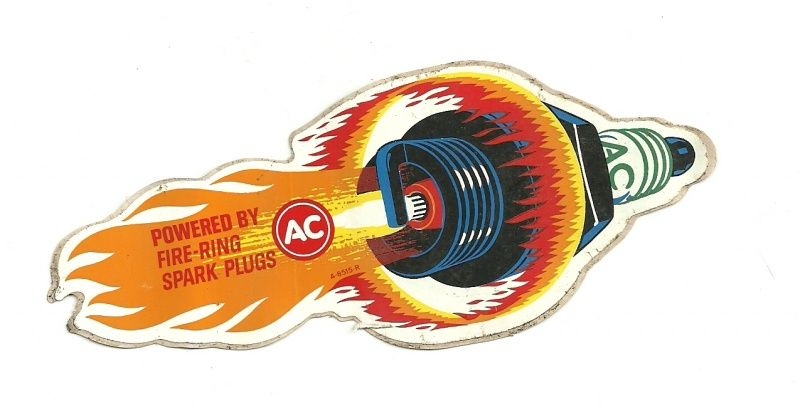
Powering Natural Gas Trucks: The Spark
The difference between a diesel engine and a gasoline engine is a combination of the fuel and the way the engine ignites the fuel to create power. Read More
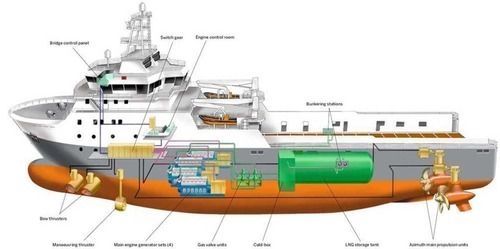
Natural Gas Ships
If you want to look for some of the worst vehicular polluters, look no further than the ships that carry cargo on the oceans and waterways. Read More
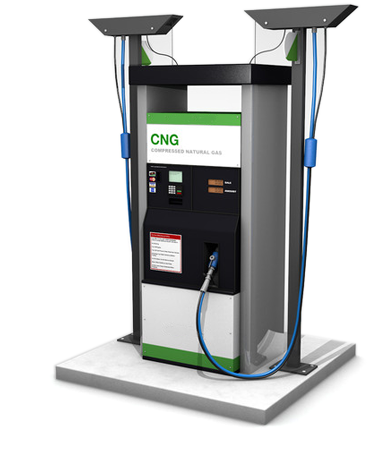
Trucks Are Not the Only Nat Gas Converts
There is quite a bit of noise being made about using either Compressed Natural Gas (CNG) or Liquidfied Natural Gas (LNG) as a motive fuel for the US fleet of over-the-road trucks. Read More

Floating Production
Where to place a manufacturing operation is a strategic decision. Raw Materials, Water, Labor, and Land all play a .... Read More

Piping Gas: Storage Methods
Short-term spikes in demand are not the only reason for gas storage. The pipeline systems need time for ..... Read More

The Fuel Alternatives: CNG & LNG — Part 1
If you are confused about the difference between Compressed Natural Gas (CNG) and Liquefied Natural Gas, and which is the best for a transportation application, join the club. Read More

Powering Natural Gas Trucks: The Costs
Figuring out what a natural gas fueled truck costs to buy and own is hard. In fact, you could say the costs are as clear as mud.
Read More
What Is the Future Price of Oil?
If you are considering using natural gas as an alternative motor fuel to diesel, the question you should ask is not what is the price difference between NG and diesel today, but what will it be next year, the year after, and in five years. Read More


